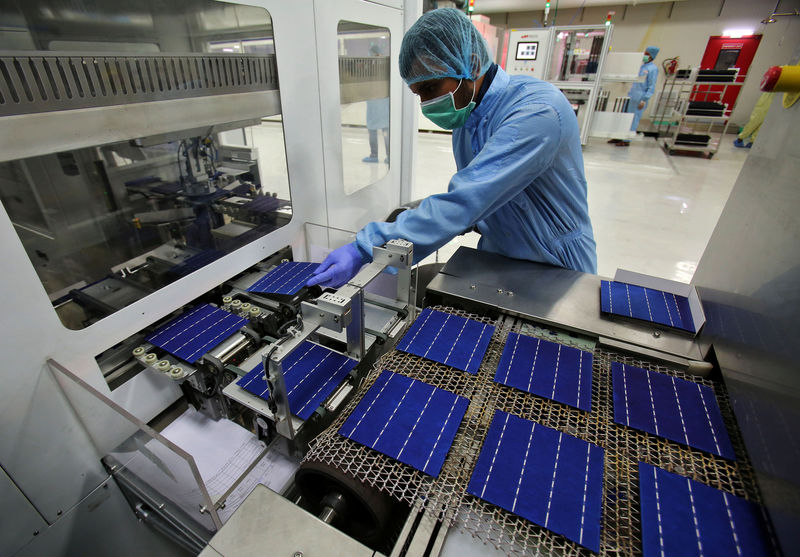By Krishna N. Das and Sudarshan Varadhan
NEW DELHI (Reuters) - Some of India's biggest solar equipment makers are facing financial collapse, priced out by Chinese competitors as Prime Minister Narendra Modi's government prioritises cheap power over local manufacturing despite his 'Make in India' push.
Though President Donald Trump is pulling the United States out of the Paris accord on climate change, India is sticking to its huge renewable energy programme. That has created a multi-billion-dollar market for Chinese solar product makers, who are facing an overcapacity at home and steep duties in Europe.
India's solar power generation capacity has already more than tripled in three years to over 12 gigawatt (GW) as Modi targets raising energy generation from all renewable sources to 175 GW by 2022.
Chinese companies have gained the most from that increase, accounting for around 85 percent of India's solar module demand and earning around $2 billion, according to industry data. The total annual market could jump to more than $10 billion in the next few years going by the government's capacity targets.
Local companies such as Jupiter Solar, Indosolar Ltd and Moser Baer India Ltd, however, are struggling to win contracts.
Orders funnelled through a domestic-content policy have all but dried up after the World Trade Organization last September upheld an earlier ruling that found the move violated global trade norms.
As a result, Jupiter said it could shut shop by July after delivering their last orders this month; Indosolar auditors have raised doubts over it remaining as a "going concern"; and Moser Baer says it needs support from its lenders to revive its solar business.
"TORPEDOED"
Indian solar power plant developers - including companies backed by Japan's Softbank and Goldman Sachs (NYSE:GS) - are quoting ever-lower tariffs in auctions to win big projects, encouraged by steep drop in Chinese solar equipment prices.
That is squeezing out Indian cell and module makers, many of which have inferior technology, depend on imports of raw materials, have limited access to cheap loans and operate below capacity. Chinese modules are 10-20 percent cheaper than those made in India, company and industry executives said.
"The WTO ruling has torpedoed everything. It's not a case of one company - we have the largest cell operating capacity - everybody below us will shut down one after another," Jupiter CEO Dhruv Sharma told Reuters by phone.
Chinese companies were selling solar cells in India at 19-20 U.S. cents, around 35 percent below his production cost, he added.
There are more than 110 Indian solar cell and module makers registered with the government, out of which consultancy Bridge to India expects only a handful to survive.
Santosh Vaidya, a senior official in the Ministry of New & Renewable Energy, said the government was working on several initiatives to promote the domestic solar manufacturing industry. He did not elaborate.
GOING THE TELECOM WAY
India's promise, and need, as a market for solar is obvious. It is one of the lowest per-capita consumers of electricity in the world and more than 200 million of its people are still not connected to the grid, making it crucial for the government to aggressively push for cheap power.
Despite its low labour costs, it is not alone in buckling under pressure from Chinese competition. Earlier this month, Germany's SolarWorld, once Europe's largest solar panel maker, said it would file for insolvency.
Indian companies produced an estimated 1.33 GW of modules last year out of the total capacity of 5.29 GW, according to Bridge to India. Total consumption of modules - 60 percent of a solar project's cost - was around 4 GW.
Solar project developer SB Energy, a joint venture between SoftBank, Taiwan's Foxconn and India's Bharti Enterprises, said it had discussed the shortage of local manufacturing with the government.
"Lack of significant domestic solar manufacturing capacity is a concern, as this is a major gap," SB Energy Executive Chairman Manoj Kohli said, drawing a parallel with India's huge mobile phone market but negligible local production.
Several company executives said a lack of scale, absence of raw material supply chains and rapidly changing technology were some of other reasons Indian firms were unable to compete with Chinese manufacturers such as Trina Solar and Yingli.

"The government is busy bringing power prices down ... but you can't build castles on graves," Gyanesh Chaudhary, CEO of module maker Vikram Solar told Reuters. "Without a domestic manufacturing ecosystem, no public policy can last for a long time."